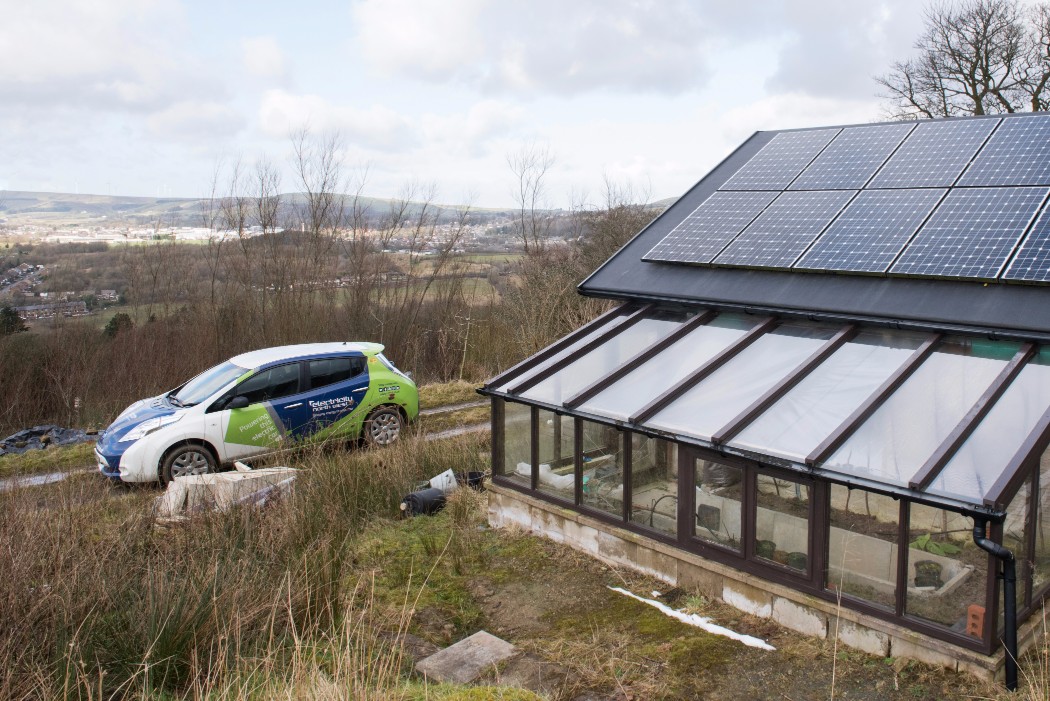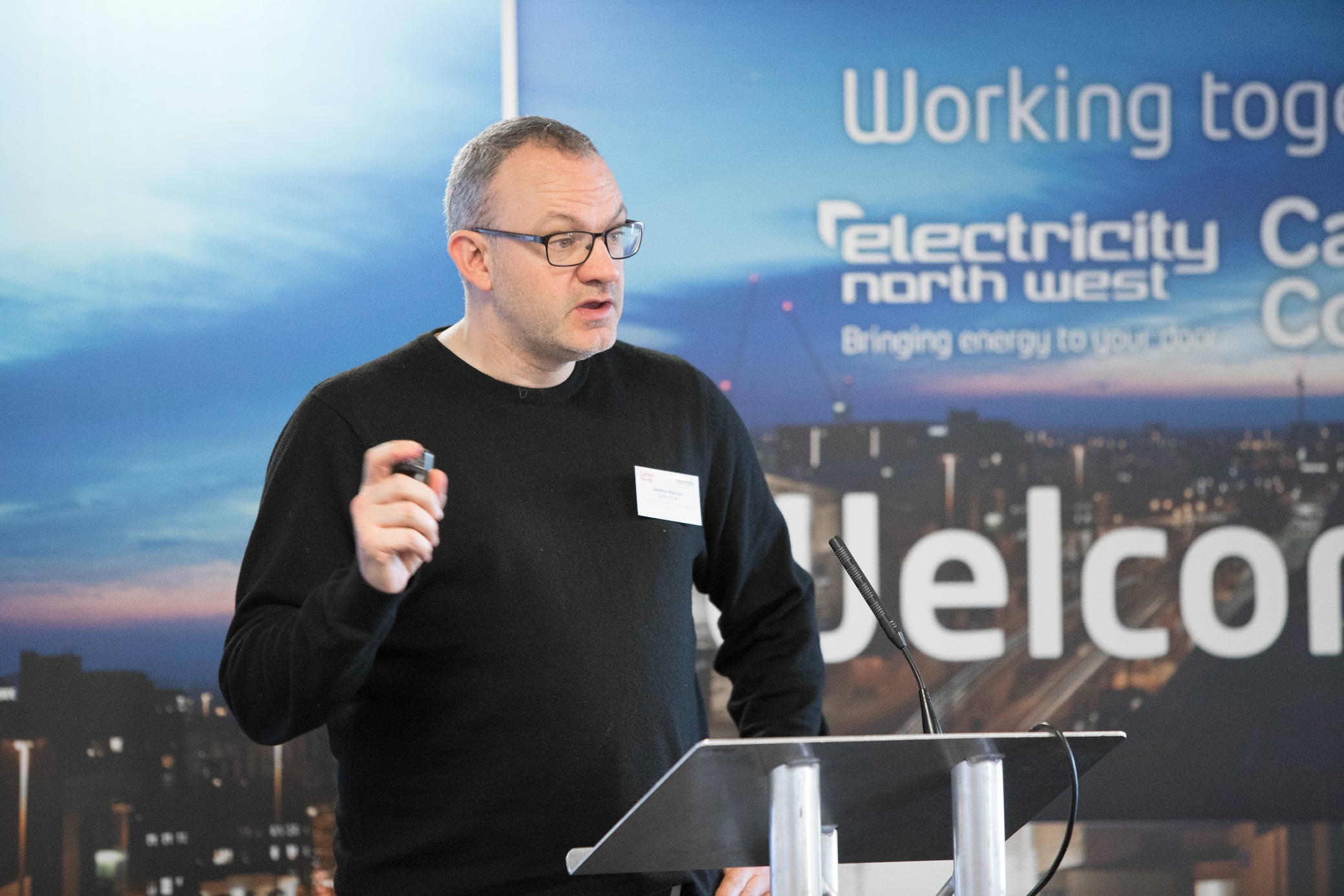Guest blog: Community Energy – reasons to be cheerful!
Guest blog: Community Energy – reasons to be cheerful!
On the eve of Community Energy fortnight, Jonathan Atkinson, project manager and co-founder of Community Energy group Carbon Co-op, takes a look at the latest positive developments in Community Energy.
Community Energy has been in the doldrums since the Government cut back on incentives and funding such as the feed in tariffs. However, the sector has always been resourceful, packed full of hard working, highly motivated and flexible people and has shown a flare for exploiting new opportunities that present themselves. 
Grid services
One area of future growth for Community Energy groups is the delivery of grid services and DNOs (Distribution Network Operators) such as Electricity North West have been very supportive of this development. As the energy system transitions to a decentralised model, with more episodic, renewable generation and more demand in the form of electric vehicles and electric heat, there is becoming a huge need for local flexibility – the ability for consumers to vary how and when they use energy. Intermediary actors known as Aggregators are needed to sit between large groups of householders and businesses and the organisations that run and use the grid: DNOs, suppliers, etc. Often grid problems arise at very localised levels, for example on a single sub-station. It's obvious that the need for trusted, locally focused Aggregators should be filled by Community Energy groups.
Carbon Co-op is currently leading on two BEIS (Department of Business, Energy and Industrial Strategy) funded feasibility projects on local flexibility markets see here and domestic demand side response here working with Regen, Community Energy Scotland, Megni and EV Parts. Our work has focussed on generating flexibility in the system from large electrical loads, specifically electric vehicle chargers, hot water immersion heaters powered by solar PV and storage heaters. The projects look at the potential to set up open source, federated Aggregators – enabling small, sometimes voluntary Community Energy groups to benefit from these kinds of activities by working with more technical, specialist not-for-profit regional or national co-operatives.
We're also arguing for the role of open, accountable tools, standards and frameworks such as OpenADR and USEF to be adopted UK-wide to avoid the current situation whereby every battery model operates its own, 'wall gardened' software and an EV driver needs 20 apps to charge up on a journey down the M6. It's positive that BEIS and OFGEM have been supportive of this open standards approach.
Taking control locally
I was recently in Brussels for the European Sustainable Energy Week policy conference, hearing about inspiring energy and climate change projects around the EU. Last week, the EU parliament adopted a central plank of the new Clean Energy Package – Local Energy Communities. This formalises a new energy system role – a not for profit intermediary involved in some aspects of generation, distribution, supply and energy efficiency at a local scale. Local Energy Communities will have a key role both in the energy transition, balancing the system and protecting the interests of vulnerable consumers. This role is also tailor made for Community Energy groups to play – in no small part due lobbying from our EU trade association REScoop. Local Energy Communities must now be integrated in to EU law and policy – and we must hope that post-Brexit, the UK remains aligned to or involved in the Energy Union in order for us to benefit from these changes.
Energy efficiency – back on the agenda
It seems like the failure of the Green Deal has left a huge crater where the UK's energy efficiency and retrofit policy used to sit – but recent developments suggest it's back on the agenda. In April, Carbon Co-op and Community Energy England held a one day conference on retrofit, exploring recent policy developments, addressing the need for quality and looking at new innovative technologies and business models. The day was a huge success and attended by enthusiastic groups and practitioners from around the UK.
 The Government's Call for Evidence on Building a Market for Energy
The Government's Call for Evidence on Building a Market for Energy
Efficiency shows that at least some of the lessons of Green Deal have been learned, with policy makers taking a more pragmatic approach to retrofit. At a recent BEIS briefing on a new energy efficiency competition, it was noticeable that whilst the likes of Carillon have failed to stay the course and were absent, Community Energy groups were very well represented in the audience and still keen to work in this area.
In Greater Manchester, Carbon Co-op are about to kick off a four-year project funded by the Friends Provident Foundation, to develop an infrastructure for deep retrofit in the area. This means working with our technical partners, worker co-op URBED to engage with the local supply chain and keep quality high and other inspiring Community Energy groups such as BHESCo to benefit from their skills and expertise around innovative community finance.
We're also working in Salford on an NEA-funded project to look at practical, smaller scale interventions that can make a real difference to vulnerable consumers on low incomes, with high bills and suffering the health effects of poorly heated homes.
In both cases, Carbon Co-op is seeking to avoid the mistakes of Green Deal in which large scale contractors exploited local contractors and delivered poor quality jobs. We will be working with small scale, local contractors and seeking to circulate benefits and funds locally.
Provider, protector, promoter?
These opportunities remind us of the dilemma Community Energy groups face – should we promote other people's schemes, protect and advocate for our members or get on and provide services ourselves. This issue is tackled in depth in this guest blog from Rebecca Ince an academic researcher at the University of Birmingham. Our firm belief is that if we are to grow as a sector and to protect the trusted role we hold within local communities, we need to professionalise and directly provide services.
We believe open source technologies, open standards and federated business models can enable the whole sector – a sector that has always upheld co-operative rather than competitive values - to benefit. Unless we do that, we will always be reliant on third party suppliers, manufacturers and government and we will be vulnerable to shocks and changes as the energy transition progresses.
Do enjoy Community Energy fortnight and take an opportunity to visit some of the inspiring projects changing their communities for the better!